You’ve got your flight to Costa Rica booked, your hotel reservations or tour itinerary set. Now what about getting around?
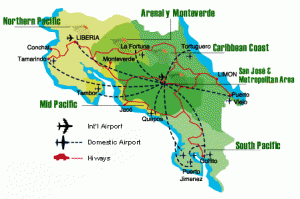 There are many choices, from in-country flights to renting a car, hopping a local bus or hiring a private shuttle or tour bus complete with bilingual driver. It all depends on how fast you want to get somewhere, how many places you want to visit, what you want to see and, of course, how much money you want to spend.
There are many choices, from in-country flights to renting a car, hopping a local bus or hiring a private shuttle or tour bus complete with bilingual driver. It all depends on how fast you want to get somewhere, how many places you want to visit, what you want to see and, of course, how much money you want to spend.
While Costa Rica is small, comparable in size to West Virginia or Switzerland, it takes a long time to get anywhere due to its rugged, mountainous terrain with many rivers, peninsulas and other natural detours. There are a few “highways” although most are only two lanes. The multi-lane highways are all in the metropolitan San Jose area and are usually so jammed with traffic they make Los Angeles rush hour look deserted.
Driving on your own in Costa Rica is harrowing and nerve-wracking at best. I know, I live and
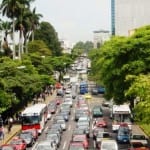 drive here every day. Costa Ricans tend to model their driving after the movie “Fast and Furious,” but without the professional training. Add to that, narrow, windy, mountainous roads that may or may not be in a state of disrepair. Add a few more challenges like multitudes of big-rig trailers, bicyclists on roads with no side shoulders (most), cattle trucks poking along, even a farm tractor or construction back-hoe trundling along in front of you. And if it’s raining? Let’s just say that Costa Rican rainstorms give a whole new meaning to the phrase “wall of water.” Street signs don’t exist. Road signs are becoming more popular, but still getting from Point A to Point B in the country can be like a treasure hunt.
drive here every day. Costa Ricans tend to model their driving after the movie “Fast and Furious,” but without the professional training. Add to that, narrow, windy, mountainous roads that may or may not be in a state of disrepair. Add a few more challenges like multitudes of big-rig trailers, bicyclists on roads with no side shoulders (most), cattle trucks poking along, even a farm tractor or construction back-hoe trundling along in front of you. And if it’s raining? Let’s just say that Costa Rican rainstorms give a whole new meaning to the phrase “wall of water.” Street signs don’t exist. Road signs are becoming more popular, but still getting from Point A to Point B in the country can be like a treasure hunt.
So what’s one to do?
Here are 3 top options for you in how best to get around Costa Rica.
Private Shuttle Transportation
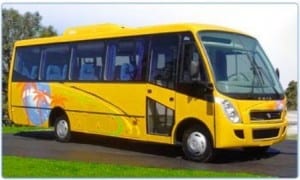 Leave the driving to someone else – someone well-trained in how to drive Costa Rica’s roads, someone who knows where he/she is going, someone who’ll get you there safely – and let go of all of the stress and responsibility.
Leave the driving to someone else – someone well-trained in how to drive Costa Rica’s roads, someone who knows where he/she is going, someone who’ll get you there safely – and let go of all of the stress and responsibility.
There are many companies offering private transportation service in Costa Rica – some that are shared-rides and others that will provide your own personal driver and vehicle. The benefit to having your own driver (bilingual or Spanish-speaking only) and vehicle is that it is yours and yours alone to do with and go where you want. Choose wisely which company you use, to make sure it is reputable, professional, insured, with a good track record, and has professional drivers and vehicles in excellent condition.
Trans Mira Tours is a tourist transportation company that’s been in business for 27 years. 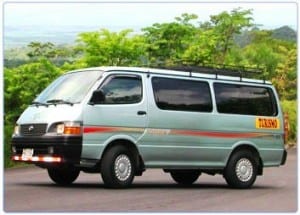 Their fleet of 5 different buses, from 1-8 passenger mini-vans to 54-passenger first-class tour buses, takes you all over Costa Rica and to Nicaragua. They offer special assistance for pregnant and handicapped passengers. Their drivers are bilingual in Spanish-English and they give you free bottled water on board. You can arrange for extra services like cold face towels, soft drinks, snacks and box lunches, souvenir gifts for groups, airport assistance and tour guides. An added plus is that Trans Mira Tours is recognized and honored as a “Carbon Neutral Company” by the Costa Rica National University – one of only a few in the nation’s transportation industry.
Their fleet of 5 different buses, from 1-8 passenger mini-vans to 54-passenger first-class tour buses, takes you all over Costa Rica and to Nicaragua. They offer special assistance for pregnant and handicapped passengers. Their drivers are bilingual in Spanish-English and they give you free bottled water on board. You can arrange for extra services like cold face towels, soft drinks, snacks and box lunches, souvenir gifts for groups, airport assistance and tour guides. An added plus is that Trans Mira Tours is recognized and honored as a “Carbon Neutral Company” by the Costa Rica National University – one of only a few in the nation’s transportation industry.
In-country Flights
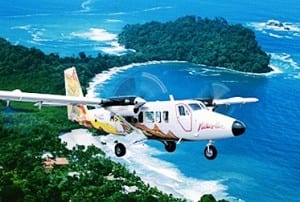 In-country flights are the perfect option for travelers who want to visit as many places as possible in a short amount of time. Plus, you get a beautiful aerial view of the landscape. You’ll save the many hours that it takes to get anywhere using ground transportation.
In-country flights are the perfect option for travelers who want to visit as many places as possible in a short amount of time. Plus, you get a beautiful aerial view of the landscape. You’ll save the many hours that it takes to get anywhere using ground transportation.
Down sides are that the domestic airlines have luggage restrictions of 25 pounds (12 kg) per passenger, and you don’t get to see the countryside up close or stop along the way to get the local flavor of people and places.
Costa Rica has two “national” airlines – Sansaand Nature Air – and a half-dozen or so 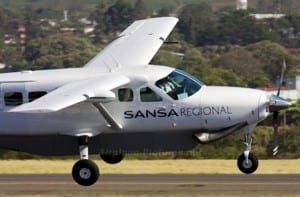 charter air companies. Sansa’s flights conveniently leave from the Juan Santamaria International Airport, from the Sansa terminal next door to international flights, and go to 11 destinations in Costa Rica many times a day. Adult tickets range in price from $40 to $91 on one-way fares. Nature Air flies to 13 destinations inside Costa Rica, plus Bocas del Toro in Panama and Managua in Nicaragua. Flights depart from San Jose’s Pavas International Airport; adult tickets range in price from $44 to $184 on one-way fares.
charter air companies. Sansa’s flights conveniently leave from the Juan Santamaria International Airport, from the Sansa terminal next door to international flights, and go to 11 destinations in Costa Rica many times a day. Adult tickets range in price from $40 to $91 on one-way fares. Nature Air flies to 13 destinations inside Costa Rica, plus Bocas del Toro in Panama and Managua in Nicaragua. Flights depart from San Jose’s Pavas International Airport; adult tickets range in price from $44 to $184 on one-way fares.
Or, if you have enough persons in your group (generally 6 or more), it may be more cost-effective to charter your own plane. Try Paradise Air, Alfa Romeo Air, Aero Bell or Nature Air also offers charter flights.
Car Rental
Caution advisories for driving in Costa Rica aside, renting a car is relatively easy and gives you the most flexibility. You can go where you want, when you want. And if you’re used to driving in say, Downtown Los Angeles, New York City, Miami or Rome for instance, then you probably won’t have a problem with Costa Rican drivers.
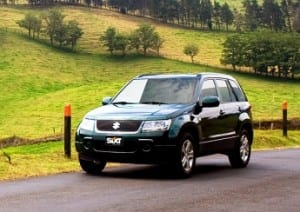 More than a dozen companies offer car rental services in Costa Rica. You can get a vehicle easily from both international airports (Juan Santamaria in the San Jose metropolitan area and Daniel Oduber in Liberia), or all of the main tourist cities. If you’re travelingduring rainy season (May-November) it is highly recommended to get a 4x4 vehicle to better deal with the country’s road conditions this time of year. Otherwise, unless you’re going somewhere really remote, a regular sedan will do you just fine.
More than a dozen companies offer car rental services in Costa Rica. You can get a vehicle easily from both international airports (Juan Santamaria in the San Jose metropolitan area and Daniel Oduber in Liberia), or all of the main tourist cities. If you’re travelingduring rainy season (May-November) it is highly recommended to get a 4x4 vehicle to better deal with the country’s road conditions this time of year. Otherwise, unless you’re going somewhere really remote, a regular sedan will do you just fine.
Best to make a reservation in advance, however, which you can do via internet. It’s quite common for tourists to land in the country and think they can rent a car upon arrival only to find no cars available – especially in high season (Dec-April). Definitely choose wisely the company you use! Make sure it is a real licensed business, has its operating permits, insurance, and is reputable, professional and honest. Ask about “hidden fees” and liability. Make sure they offer 24-hour help service. If the car they give you looks like a clunker, it will be one. Ask for a different vehicle or go somewhere else; you’re the customer and in charge.
Some down sides to car rental are that it will set you back from $47 to $130 a day, there are up-front high deposit blocks of usually $1,000 or more on your credit card for rental (no debit cards or cash accepted for deposit and rental fees), there are high insurance fees, and renters must be at least 23 years old to get a car.
Comments